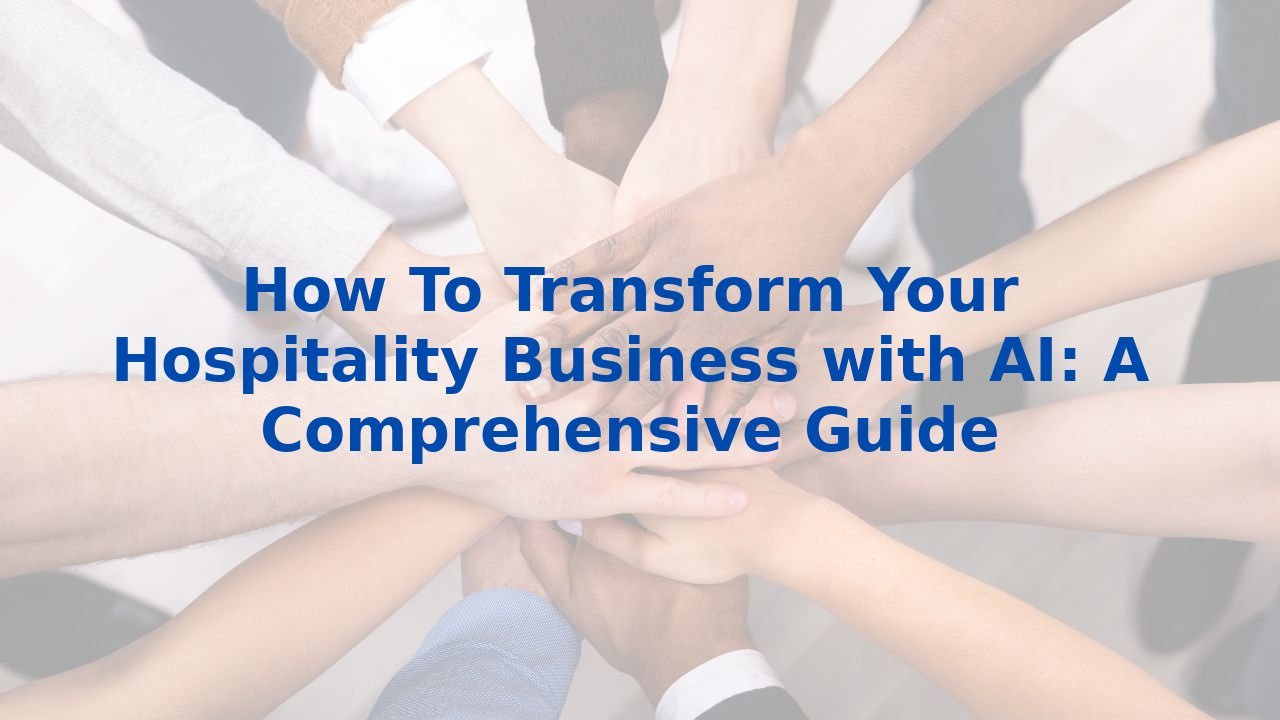How To Transform Your Hospitality Business with AI: A Comprehensive Guide
The Future of Hospitality: Transforming Business Processes with AI
As the hospitality industry continues to evolve, hotel managers, F&B directors, and sustainable hotel professionals must remain vigilant and adaptive. With the advent of artificial intelligence (AI), there are unprecedented opportunities to enhance business processes, drive operational efficiency, and elevate guest experiences. This article explores how AI can profoundly impact various aspects of the hospitality sector and emphasizes the importance of employee training to seize these advantages.
Streamlining Operations
One of the most significant benefits of AI in the hospitality sector is the streamlining of operations. Traditional processes can often be cumbersome, involving repeated manual tasks that consume valuable resources. AI can automate key functions such as inventory management, staffing schedules, and reservations, ensuring that these processes are not only efficient but also error-free.
For instance, AI algorithms can predict demand patterns, enabling establishments to optimize their inventory levels. This predictive capability can result in substantial cost savings by minimizing wastage and reducing overstock or stockouts. By leveraging these AI insights, hotel managers can allocate resources more effectively and maintain a higher level of service.
Enhancing Guest Experience
The ultimate goal of the hospitality industry is to provide guests with an exceptional experience. AI offers tools that can help professionals achieve this by personalizing services, improving communication, and anticipating guest needs. Imagine a scenario where AI analyzes guest preferences and behaviors, allowing hotels to tailor offerings beautifully. From room selections to dining options, AI can create unique experiences that keep guests coming back.
Additionally, chatbots and virtual assistants powered by AI allow for seamless communication with guests. Whether it’s answering questions about hotel amenities or making reservations at local restaurants, AI can improve response times and provide 24/7 service. This not only enhances the guest experience but also frees up human resources to focus on more complex and personalized interactions.
Optimizing Marketing Efforts
In a competitive landscape, effective marketing is crucial for driving occupancy rates and sales. AI can analyze vast amounts of data to uncover insights about customer demographics and preferences, allowing hotels to tailor their marketing campaigns accordingly. This targeted approach can significantly improve conversion rates and overall return on investment.
Furthermore, AI algorithms can determine the optimal times for promotional offers, leading to increased engagement and bookings. For hotel managers and F&B directors, this means more tailored marketing strategies that resonate with potential guests, ultimately leading to higher revenue.
Improving Staff Training and Development
While AI undeniably impacts business processes, it is essential to recognize the importance of training employees to harness its full potential. The introduction of AI into the workplace transforms roles and responsibilities, necessitating ongoing employee training in AI technologies and methodologies.
Equipping staff with the knowledge necessary to understand and implement AI innovations not only promotes a culture of learning but also enhances overall operational efficiency. Trained employees can better utilize AI tools to their advantage, leading to improved decision-making and service delivery. This creates a positive feedback loop where an empowered workforce drives improved guest experiences, which in turn boosts hotel performance.
Commitment to Sustainability
As sustainability becomes increasingly paramount in the hospitality industry, AI can streamline efforts to meet these objectives. From energy management systems that adjust heating and cooling to minimize energy consumption to predictive analytics that optimize supply chains and reduce waste, AI plays a pivotal role in fostering sustainable practices.
Hotel managers and F&B directors can leverage AI to track and analyze sustainability metrics, ensuring compliance and facilitating future improvements. By integrating AI into sustainability efforts, hotels can further enhance their reputation and appeal to environmentally conscious travelers.
Conclusion: Embracing AI for a Competitive Edge
The benefits of integrating AI into business processes in the hospitality sector are undeniable. From streamlining operations to enhancing guest experiences and optimizing marketing efforts, AI presents an opportunity for organizations to elevate their service standards. However, the true potential of AI can only be realized through a commitment to training employees, ensuring they are equipped to adapt to and leverage these advancements.
For hotel leaders looking to embark on this transformative journey, investing in comprehensive AI training for their workforce can pave the way to a more efficient, sustainable, and guest-centric establishment. By embracing AI, the hospitality industry can not only navigate the challenges of today but also thrive in the future.
For more information on training your entire organization with AI skills, visit Complete AI Training.



